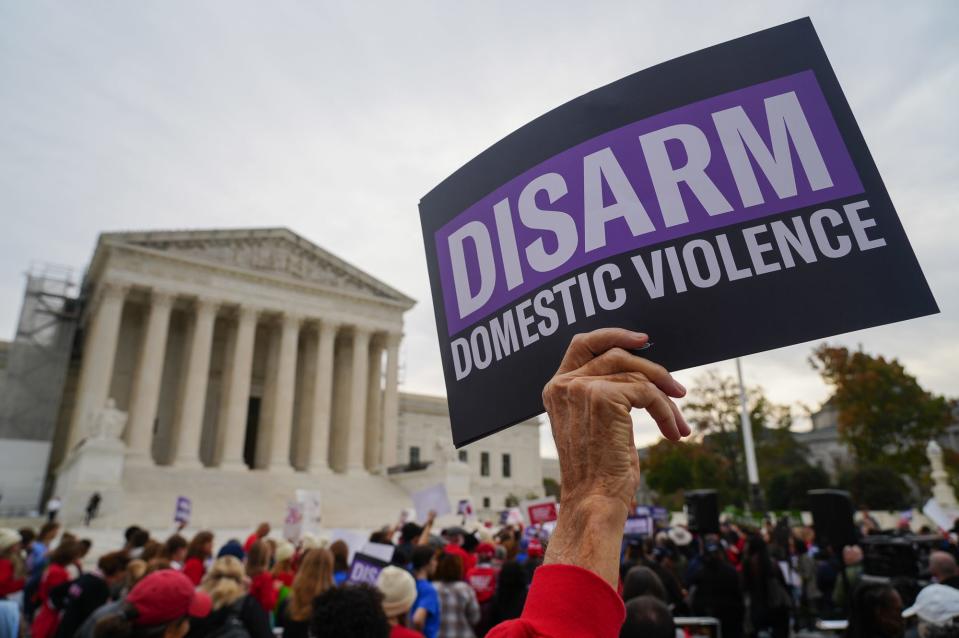Supreme Court upholds law banning domestic abusers from owning guns
- Oops!Something went wrong.Please try again later.
- Oops!Something went wrong.Please try again later.
WASHINGTON − The Supreme Court on Friday upheld a law banning domestic abusers from owning guns, showing that a conservative court which has expanded gun rights also sees areas for limitations.
"Since the founding, our Nation’s firearm laws have included provisions preventing individuals who threaten physical harm to others from misusing firearms," Chief Justice John Roberts wrote for the 8-1 majority.
Justice Clarence Thomas, the lone dissenter, said there isn't a "single historical regulation" that justifies the ban.
Justice Ketanji Brown Jackson joined the majority but quibbled with analyzing statutes based on how they would have been viewed historically. She said a historical perspective on the Second Amendment would depend on the historians who are consulted.
“Who is protected by the Second Amendment, from a historical perspective?” Jackson wrote “I could go on – as others have. But I won’t.”
The case centered on a Texas man, Zackey Rahimi, who was involved in five shootings between 2020 and 2021. Rahimi pleaded guilty to the federal crime of possessing guns while subject to a restraining order, but an appeals court threw out his conviction.
The New Orleans-based 5th U.S. Circuit Court of Appeals relied on the court’s blockbuster 2022 decision striking down a New York law that required state residents to have "proper cause" to carry a handgun.
In that 6-3 opinion, the court ruled that gun regulations must be "consistent with this nation's historical tradition of firearm regulation" to survive court challenges.
During the court’s discussion of Rahimi’s case in November, the question arose of what to do about a situation, such as domestic violence, in which there was essentially no law on the books when the Second Amendment was enacted. Much of the discussion focused on the idea that even if the framers didn't ban domestic abusers from owning guns, there was historical precedent for banning guns from people who were considered dangerous.
Thomas, who wrote the 2022 decision, disagreed with the majority in Friday's opinion and accused the other justices of “mixing and matching historical laws.” He called that strategy a “regulatory blank check” to allow the government to disarm its citizens.
“That means the Government need only find a historical law with a comparable justification to validate modern disarmament regimes,” Thomas wrote. “As a result, historical laws fining certain behavior could justify completely disarming a person for the same behavior.”
'Hardly a model citizen'
While the appeals court had acknowledged Rahimi was "hardly a model citizen,” it ruled the law prohibiting him from owning a gun is an "outlier that our ancestors would never have accepted."
Underscoring the significance of the case, hundreds of gun safety and domestic violence prevention advocates had rallied outside the Supreme Court ahead of the November oral arguments, holding signs that read "Moms demand action" or "students demand action" on gun control.

Even Second Amendment rights groups acknowledged that Rahimi probably should not have access to guns. In 2019, Rahimi pulled out a gun and fired at a passerby who witnessed him dragging his girlfriend through a parking lot. Months later, after getting into an accident, he repeatedly shot at the other driver. In 2021, he fired several times after a friend's credit card was declined at a Whataburger burger joint.
But those groups, including the National Rifle Association, argued that Rahimi should have his guns confiscated only after he has been convicted of the crimes. The federal law that bars people from owning guns because of a restraining order, those groups say, is inconsistent with the way courts have historically viewed punishment.
In the other major case involving guns this year, the Supreme Court struck down a Trump-era federal ban on bump stocks, a device that lets a shooter fire a semi-automatic rifle more like a machine gun.
The court, in recent years, has tended to side with gun rights advocates, including in major decisions in 2008, 2010 and the 2022 decision striking down New York’s gun licensing law.
The case is United States v. Rahimi.
This article originally appeared on USA TODAY: Supreme Court upholds law banning domestic abusers from owning guns

